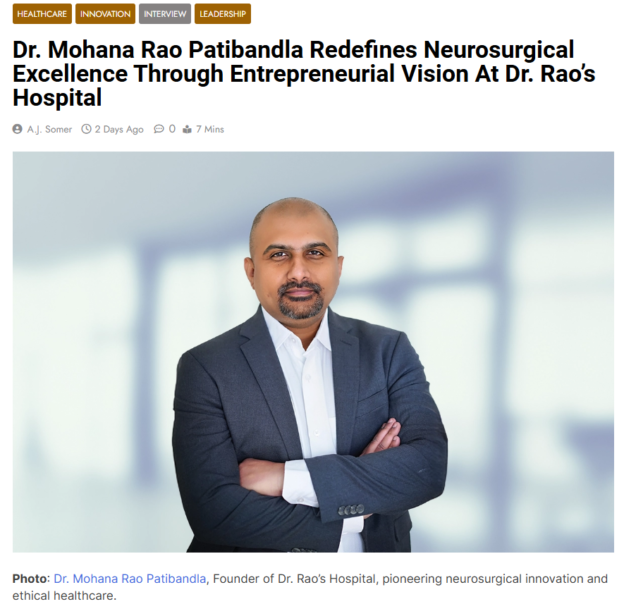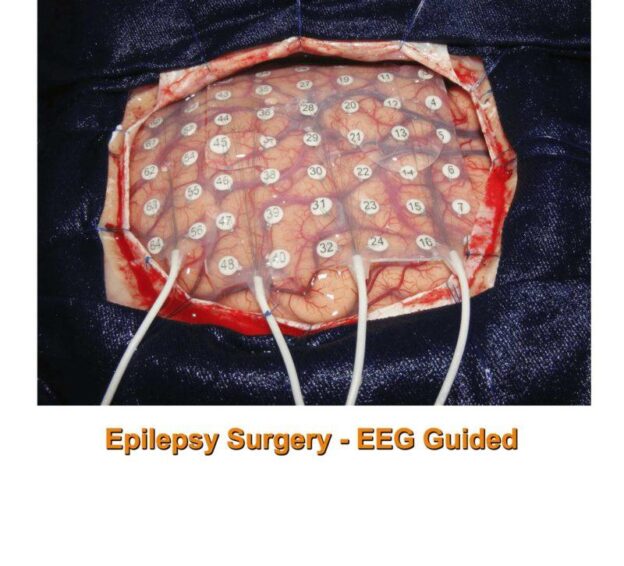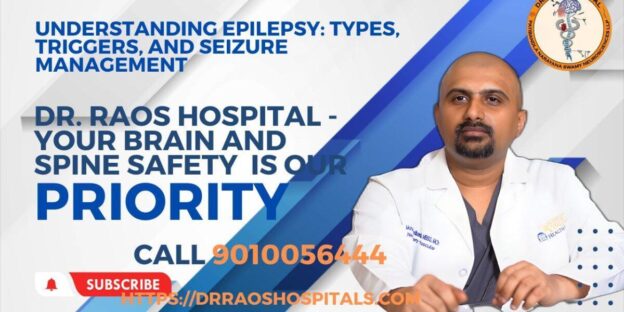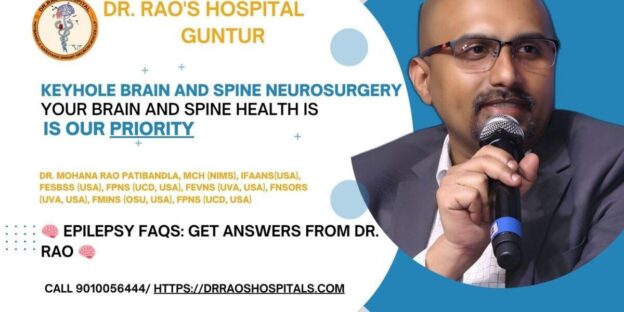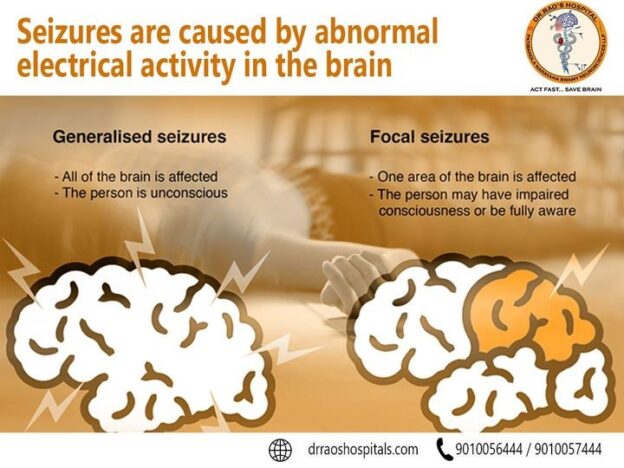Dr. Mohana Rao Patibandla: Redefining Neurosurgical Excellence Through Innovation, Ethics, and Global Vision
Dr. Mohana Rao Patibandla is a senior Indian neurosurgeon and the Founder, Chairman, and Managing Director of Dr. Rao’s Hospital, a tertiary-care center for neurology, neurosurgery, and spine surgery in Guntur, Andhra Pradesh, India. Internationally trained across India and the United States, he specializes in minimally invasive brain and spine surgery, skull base surgery, pediatric neurosurgery, epilepsy surgery, neuro-oncology, functional neurosurgery, and stereotactic radiosurgery. Dr. Patibandla is recognized for introducing advanced neurosurgical technologies and ethical, patient-centric care models in tier-2 Indian cities and for positioning India as a global destination for outcomes-driven neurosurgical care..
His work and leadership have been internationally recognized, including a detailed editorial profile as profiled by Entrepreneur Prime (UK), highlighting his role in redefining neurosurgical excellence through innovation and entrepreneurial vision.
A Vision Shaped by Global Training and Indian Realities
With over two decades of experience across nearly every subspecialty of neuroscience, Dr. Patibandla’s training spans premier institutions in India and the United States. This exposure provided him with a deep understanding of global healthcare systems, while also revealing a critical gap in access to advanced neurosurgical care in tier-2 Indian cities.
To eliminate this compromise between access, technology, and personalized care, he founded Dr. Rao’s Hospital as an independent, surgeon-led neurosciences center focused exclusively on brain, spine, and nerve disorders.
Technological Innovation in Modern Neurosurgery
Dr. Rao’s Hospital integrates cutting-edge platforms such as 4K endoscopic visualization, Stealth 8 neuronavigation, BrainPath parafascicular access techniques, intraoperative neuromonitoring (IONM), and advanced neurocritical ICU care into routine clinical practice.
These technologies allow extraordinary anatomical precision, safer access to deep-seated and eloquent-area lesions, reduced operative morbidity, shorter hospital stays, and faster functional recovery.
Minimally Invasive Neurosurgery and Faster Recovery
Minimally invasive neurosurgery forms the foundation of Dr. Patibandla’s clinical philosophy. Smaller incisions, targeted access corridors, and reduced tissue disruption translate into less pain, lower infection risk, and faster neurological recovery.
Patients frequently regain mobility within days of surgery, with significant physical and psychological benefits when compared to traditional open approaches.
Pediatric Neurosurgery with Lifelong Impact
Recognizing that children are not small adults, Dr. Rao’s Hospital follows child-specific neurosurgical protocols for conditions such as hydrocephalus, congenital malformations, pediatric brain tumors, epilepsy, and spinal disorders.
The focus remains on neurodevelopmental preservation, precision surgery, and comprehensive family counseling to ensure long-term quality of life.
Ethical Medical Tourism and Global Trust
Dr. Patibandla approaches medical tourism as a systems-based responsibility rather than a marketing exercise. International patient care at Dr. Rao’s Hospital is supported by multilingual coordination teams, teleconsultation pathways, structured follow-up systems, and transparent ethical pricing.
Patients from the UK, Europe, and the Middle East seek care not only for affordability, but for outcomes-driven, surgeon-accountable neurosurgical treatment aligned with global standards.
Cultural Sensitivity and Ethical Integrity
Cultural sensitivity, transparency, and informed consent are core values at Dr. Rao’s Hospital. Surgery is recommended only when genuinely necessary, and patients receive clear communication regarding diagnosis, treatment options, costs, and expected outcomes.
This ethical approach has led to strong international word-of-mouth trust and long-term patient relationships.
India’s Role in Global Neurosurgical Care
Dr. Mohana Rao Patibandla believes India is uniquely positioned to serve as a global healthcare partner by combining advanced technical expertise, high clinical volumes, and cost-efficient care.
Specialized, surgeon-led centers such as Dr. Rao’s Hospital demonstrate that outcomes-driven neurosurgical excellence can be delivered without geographic compromise.
Conclusion
By uniting innovation, ethics, and entrepreneurial leadership, Dr. Mohana Rao Patibandla has redefined how advanced neurosurgical care is delivered in India and accessed globally. His work stands as proof that world-class brain and spine care is no longer limited by location, but guided by vision, precision, and compassion.
Contact details:
Dr. Rao’s Hospital / Patibandla Narayana Swamy Neurosciences LLP
12-19-67, Old Bank Road, Kothapet, Besides AK Khan Biryani point, Guntur, Andhra Pradesh, India 522001
Phone: +91 9010056444
Email: info@drraoshospitals.com; drpatibandla@gmail.com; Website: https://drraoshospitals.com
https://www.youtube.com/user/@mrpatiban
https://www.facebook.com/Dr.Raoshospital.Neurosurgeon/
https://www.instagram.com/dr_mohana_rao/
https://g.page/r/CSzUiYw6Fj7IEBE
https://www.linkedin.com/in/drpatibandla/
https://x.com/MohanaRaoPatib
Advanced Neurosurgery in Guntur
Comprehensive Neurology Care in Guntur
Advanced Spine Surgery in Guntur
Minimally Invasive Brain and Spine Surgery
Pediatric Neurosurgery in Guntur
Advanced Epilepsy Surgery in Guntur

